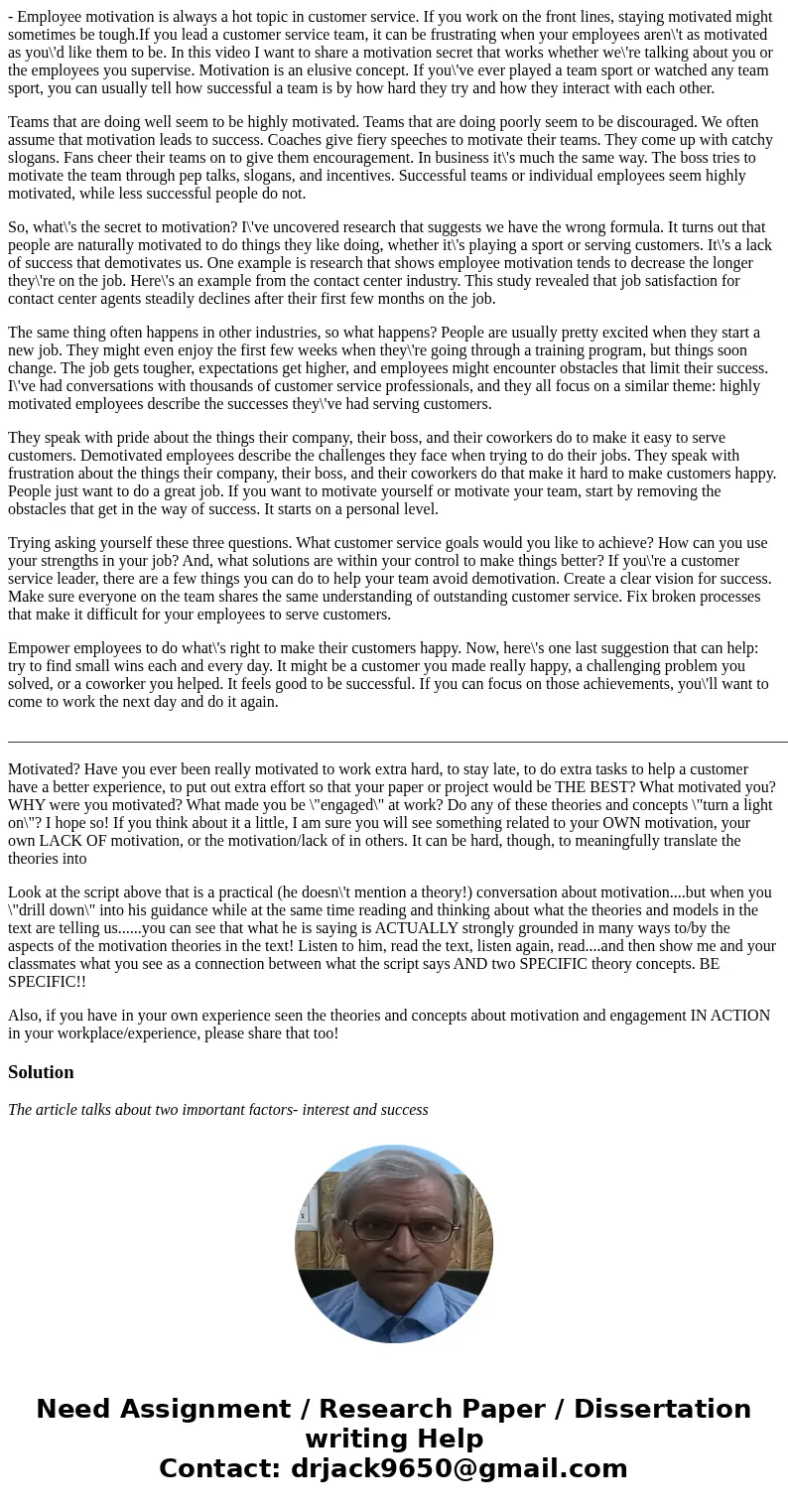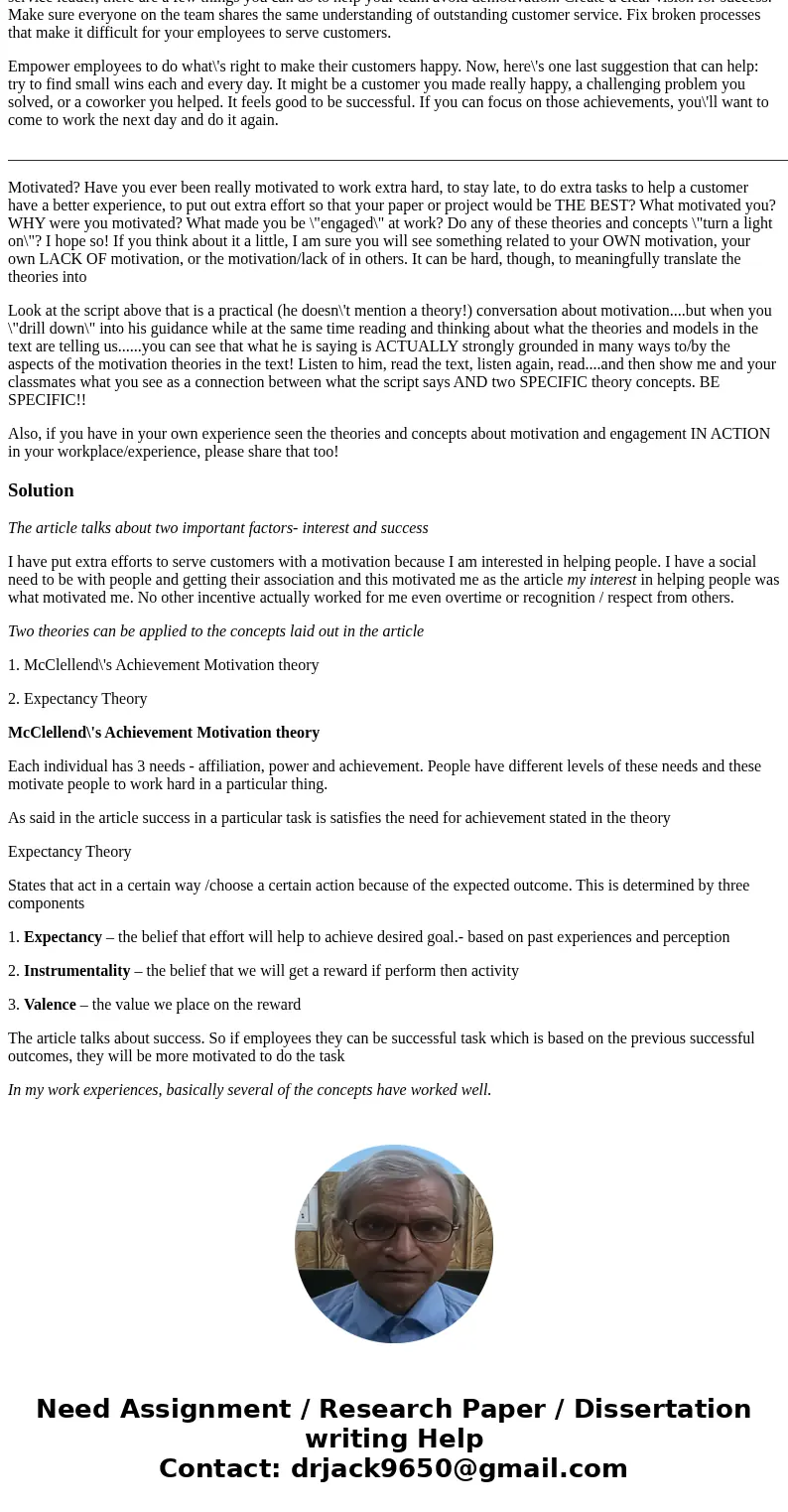Employee motivation is always a hot topic in customer servi
- Employee motivation is always a hot topic in customer service. If you work on the front lines, staying motivated might sometimes be tough.If you lead a customer service team, it can be frustrating when your employees aren\'t as motivated as you\'d like them to be. In this video I want to share a motivation secret that works whether we\'re talking about you or the employees you supervise. Motivation is an elusive concept. If you\'ve ever played a team sport or watched any team sport, you can usually tell how successful a team is by how hard they try and how they interact with each other.
Teams that are doing well seem to be highly motivated. Teams that are doing poorly seem to be discouraged. We often assume that motivation leads to success. Coaches give fiery speeches to motivate their teams. They come up with catchy slogans. Fans cheer their teams on to give them encouragement. In business it\'s much the same way. The boss tries to motivate the team through pep talks, slogans, and incentives. Successful teams or individual employees seem highly motivated, while less successful people do not.
So, what\'s the secret to motivation? I\'ve uncovered research that suggests we have the wrong formula. It turns out that people are naturally motivated to do things they like doing, whether it\'s playing a sport or serving customers. It\'s a lack of success that demotivates us. One example is research that shows employee motivation tends to decrease the longer they\'re on the job. Here\'s an example from the contact center industry. This study revealed that job satisfaction for contact center agents steadily declines after their first few months on the job.
The same thing often happens in other industries, so what happens? People are usually pretty excited when they start a new job. They might even enjoy the first few weeks when they\'re going through a training program, but things soon change. The job gets tougher, expectations get higher, and employees might encounter obstacles that limit their success. I\'ve had conversations with thousands of customer service professionals, and they all focus on a similar theme: highly motivated employees describe the successes they\'ve had serving customers.
They speak with pride about the things their company, their boss, and their coworkers do to make it easy to serve customers. Demotivated employees describe the challenges they face when trying to do their jobs. They speak with frustration about the things their company, their boss, and their coworkers do that make it hard to make customers happy. People just want to do a great job. If you want to motivate yourself or motivate your team, start by removing the obstacles that get in the way of success. It starts on a personal level.
Trying asking yourself these three questions. What customer service goals would you like to achieve? How can you use your strengths in your job? And, what solutions are within your control to make things better? If you\'re a customer service leader, there are a few things you can do to help your team avoid demotivation. Create a clear vision for success. Make sure everyone on the team shares the same understanding of outstanding customer service. Fix broken processes that make it difficult for your employees to serve customers.
Empower employees to do what\'s right to make their customers happy. Now, here\'s one last suggestion that can help: try to find small wins each and every day. It might be a customer you made really happy, a challenging problem you solved, or a coworker you helped. It feels good to be successful. If you can focus on those achievements, you\'ll want to come to work the next day and do it again.
_________________________________________________________________________________________________________________________________________________________
Motivated? Have you ever been really motivated to work extra hard, to stay late, to do extra tasks to help a customer have a better experience, to put out extra effort so that your paper or project would be THE BEST? What motivated you? WHY were you motivated? What made you be \"engaged\" at work? Do any of these theories and concepts \"turn a light on\"? I hope so! If you think about it a little, I am sure you will see something related to your OWN motivation, your own LACK OF motivation, or the motivation/lack of in others. It can be hard, though, to meaningfully translate the theories into
Look at the script above that is a practical (he doesn\'t mention a theory!) conversation about motivation....but when you \"drill down\" into his guidance while at the same time reading and thinking about what the theories and models in the text are telling us......you can see that what he is saying is ACTUALLY strongly grounded in many ways to/by the aspects of the motivation theories in the text! Listen to him, read the text, listen again, read....and then show me and your classmates what you see as a connection between what the script says AND two SPECIFIC theory concepts. BE SPECIFIC!!
Also, if you have in your own experience seen the theories and concepts about motivation and engagement IN ACTION in your workplace/experience, please share that too!
Solution
The article talks about two important factors- interest and success
I have put extra efforts to serve customers with a motivation because I am interested in helping people. I have a social need to be with people and getting their association and this motivated me as the article my interest in helping people was what motivated me. No other incentive actually worked for me even overtime or recognition / respect from others.
Two theories can be applied to the concepts laid out in the article
1. McClellend\'s Achievement Motivation theory
2. Expectancy Theory
McClellend\'s Achievement Motivation theory
Each individual has 3 needs - affiliation, power and achievement. People have different levels of these needs and these motivate people to work hard in a particular thing.
As said in the article success in a particular task is satisfies the need for achievement stated in the theory
Expectancy Theory
States that act in a certain way /choose a certain action because of the expected outcome. This is determined by three components
1. Expectancy – the belief that effort will help to achieve desired goal.- based on past experiences and perception
2. Instrumentality – the belief that we will get a reward if perform then activity
3. Valence – the value we place on the reward
The article talks about success. So if employees they can be successful task which is based on the previous successful outcomes, they will be more motivated to do the task
In my work experiences, basically several of the concepts have worked well.


 Homework Sourse
Homework Sourse